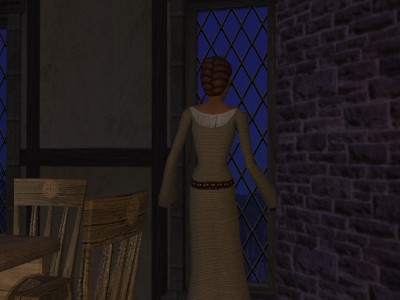
“I think someone’s coming!” Mouse called eagerly from the window.
“You keep thinking and thinking, Mouse,” Oswald said. “No one ever does.”
“But I think I see someone in the trees!”
Wynflaed could not bear it. All day long Mouse had been running to the window, and constant disappointment did not seem to have lessened her optimism in the slightest.
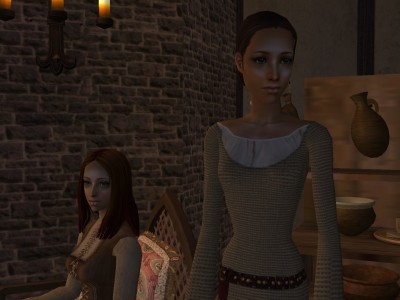
Wynflaed herself had chosen the opposite course and had scrupulously avoided looking outside. She simply assumed he would not come: then she could not be disappointed. And she would not be seen looking for him.
“I think you’re right,” Oswald said after he had looked.
“It’s him! I know it is!” Mouse said. “Oh, little mother, may we go see?”
“How can you tell who it is?” Wynflaed cried. “It’s nearly dark!”
“I can tell by his walk! He doesn’t walk like a farmer. Oh, I knew he would come today! I told you! Come on, Wyn!”
“I am not going out in the dark to meet Durwyn or Snell or who knows whom!”
“It’s not Durwyn or Snell, it’s Sigefrith! Come on!”
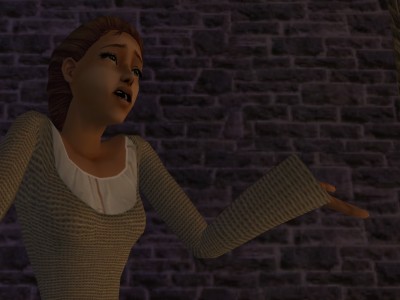
“I’m coming!” little Heafoc cried.
“That’s right, Heaf!” Mouse said. “Come on, Os, you too. We shall tell Sigefrith you don’t care to see him, Wyn!”
“Little mother!” Wynflaed cried in exasperation.
“Are you certain it is he?” their mother asked.
“I’m certain,” Mouse said. “May we go? We shan’t shout or make a fuss or anything. We only want to meet him. May we?”
“Oh… if you’re certain,” she smiled, and the three ran outside without another word.
“I didn’t think he would come any more tonight,” the little mother said after they had gone and Wynflaed closed the door behind them. “After supper, and so dark. And yet I still hoped he would!”
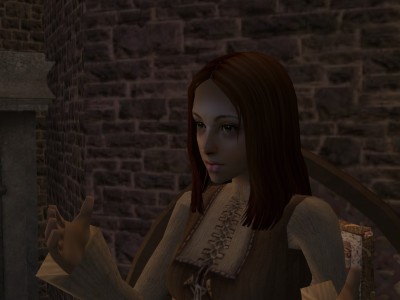
Her smile was so wistful and her little face so pale that Wynflaed thought she would be able to kick her sister if their mother were only to be disappointed in the end.
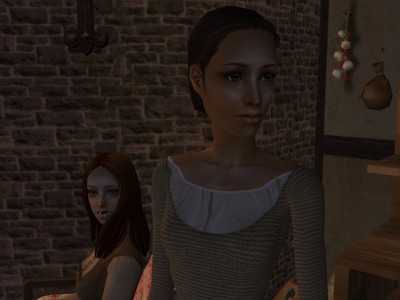
“Wyn, will you…” Her mother began to rise. “Will you help me turn my chair around?”
“Oh, little mother, no!” Wynflaed cried and went to help her sit again. “Sigefrith will turn you when he comes.”
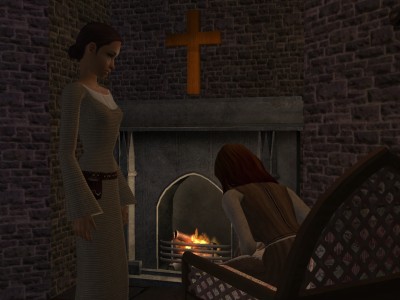
“I know he will.” Her smile twisted briefly in pain as she sat again. “But I should have liked to have seen him come in.”
“You will see him a moment afterwards!”
“Oh, Wynnie,” she said sadly, “you don’t yet know the face a man can have when he first comes home after a long absence.”
“But this isn’t his home.”
“No?” She looked up from the fire. “It’s a little like a second home to him, I think. I shouldn’t say so, but I don’t believe he is very happy in his own.”
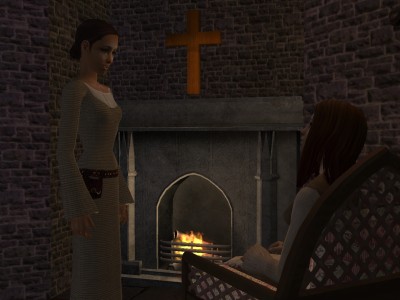
“No, I don’t think you should say so,” Wynflaed said hoarsely.
“Be kind to him, Wynnie. He’s a good man, but soft. That sort of man is soon spoiled by a hard woman.”
Sigefrith soft! She could not guess what her mother meant, but she had no time to ask. She could hear them coming up the hill: Heafoc’s squeals and Mouse’s giggles and Oswald’s excited chatter, and beneath it all Sigefrith’s deep and boyish laugh.
She had been waiting for months for him to return, and now she wished she had had more time to prepare. She only wanted to be quiet and peaceful tonight. She gripped the back of her mother’s chair and turned to the door.
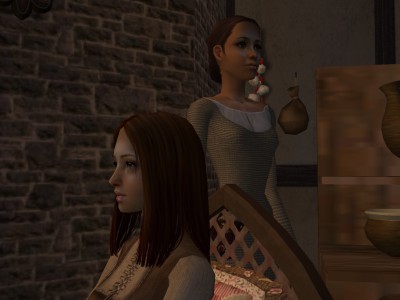
The children tumbled in ahead of him, all speaking at once in that soft voice they used at home to avoid troubling their little mother. Heafoc was tugging vainly on one of Sigefrith’s hands, for Sigefrith had stopped in the doorway and would not be moved.
Wynflaed saw at once what her mother had hoped to see by turning her chair. His eyes passed quickly over the room, and his soft smiled glowed with gratitude at having found everything to be as he remembered.
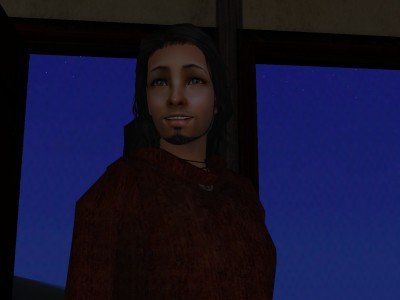
Then his eyes settled on her, as if they too had come to the end of their journey, and his smile took on that same wistfulness her mother’s had had when she had admitted having despaired and yet still hoped.
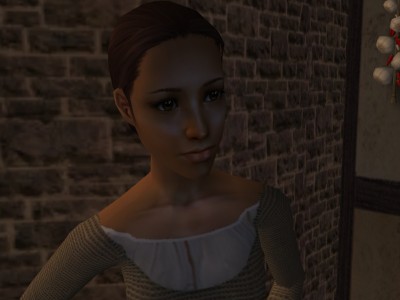
She had no time to compose her own face, no time to consider his.
Mouse cried, “I told him you didn’t care enough to come meet him, Wyn!”
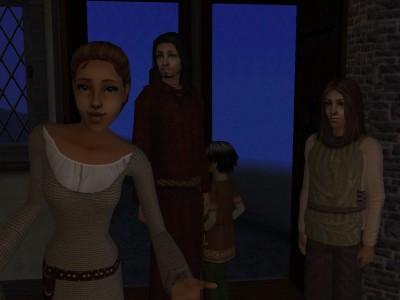
“Mouse!” Wynflaed wailed.
Sigefrith’s face changed at once into one of simple good humor, and he laughed and stepped inside.
“Now, Wyn,” their mother said, “she only dared because she knew Sigefrith wouldn’t believe it.”
“What’s that I hear?” Sigefrith gasped. “Where are you hiding that little mother, Wyn? At the bottom of this big chair?”
Their mother laughed, and Wynflaed winced for her sake. She knew how it hurt her mother to laugh—and yet she still seemed to delight in it.
Nor did Wynflaed miss the brief expression of alarm and worry that passed over Sigefrith’s face when he first looked into her mother’s. He had confirmed her own fears.
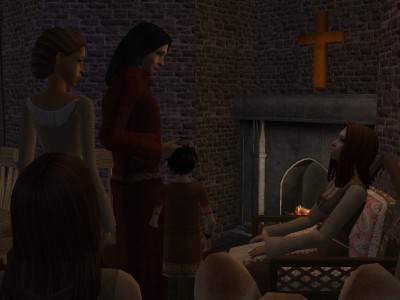
But he kissed the tiny woman and smiled at her and said to the children, “I hope you will all be willing to share your little mother with me now. My own little mother is going far away to live with my enormous father.”
“We don’t mind!” Mouse said.
“I’m certain she will miss you,” their mother said to him.
“Miss me?” he gasped. “I hadn’t thought of that. I was only thinking of how I would miss her. Selfish, I know!”
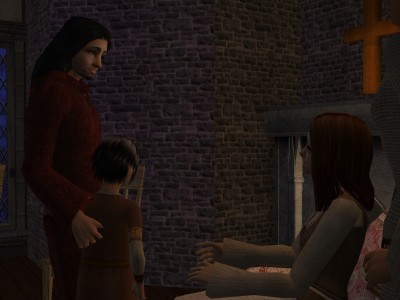
“Won’t you come sit over here?” Heafoc was pleading.
Sigefrith pounced on him and began to tickle him across the room. “Oh, you only want to me to sit so you can sit on my lap and squirm like a fat grub! But first you had better let me take off my cloak and see what falls out of it.”
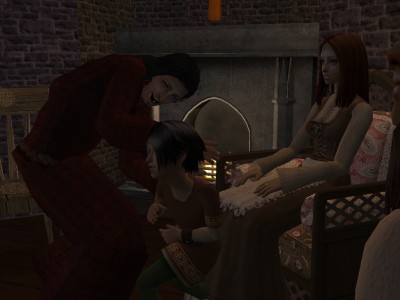
“You have something in there?” Heafoc breathed.
“Something!” Sigefrith laughed. “Something that has been poking me in the armpit all the way up the hill. You want it?” he asked the boy.
“Not if it’s been in your armpit!” Mouse cried.
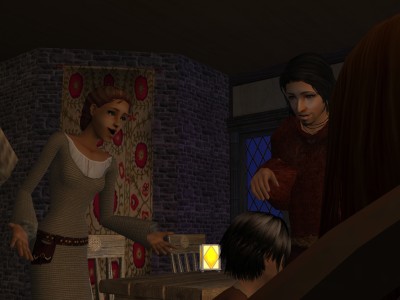
“Never mind that! You’ll see—he’ll have it in his mouth before I count to thirty, armpit or no armpit! What will you wager, Mouse?”
“A cup of elderberry wine if you win—and a kiss if I do!”
Wynflaed shrank back against the wall, mortified at Mouse’s audacity—and yet a little sorry she would never be so bold.
“Clever girl! Now I shall hope to lose.”
“You ought to offer him a cup even if he loses,” their mother smiled.
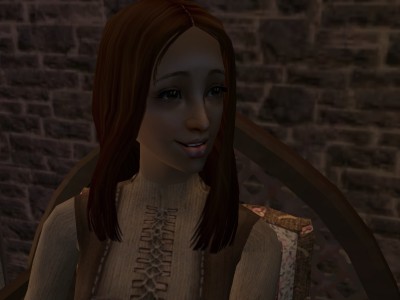
“And a kiss, too, if I win,” Sigefrith said as he shrugged out his cloak and revealed the leather bag he was carrying beneath. Heafoc was upon it at once.
“Not so fast, young runt!” Sigefrith cried and lifted it out of reach. “Gentlemen respect womanhood, beauty, and years, and we have three ladies here who surpass you in all three qualities.”
“Did you bring something for everybody?” Heafoc asked reverently.
“Sigefrith,” their mother said, “I fear you did not obey me.”
“In all things but this. Down, boy!” he said to Heafoc, who was leaping after the bag still. “This is an excellent opportunity for you to learn patience. We shall begin with those who are not in need of a lesson.”
“Begin with our little mother,” Oswald said.
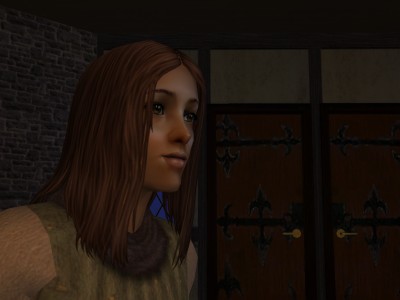
“I certainly shall.”
Wynflaed leaned against the wall behind her mother’s chair and looked on. She would have preferred to have been invisible herself, but now that he was here, she was not sorry he had come.
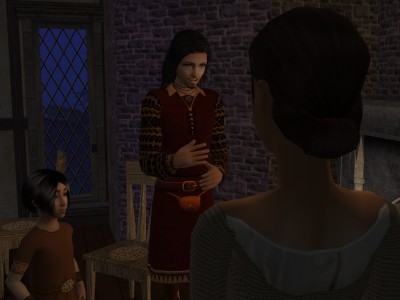
His smile was so bright and his laugh so merry that she could not understand how her mother could dream he was unhappy. He was the happiest man she had ever seen. Her father had never laughed like that—even before their little mother had fallen ill. And he was so healthy! So alive! It made her feel stronger only to look at him—and so she looked.
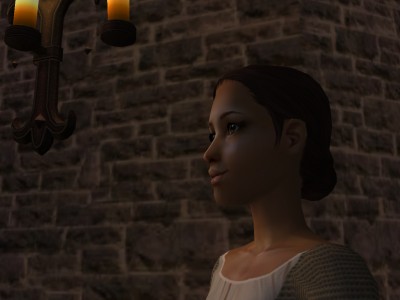
For their mother he had brought a wool shawl, saffron-dyed, from somewhere farther east even than Denmark. Wynflaed had never seen wool so soft and fine, but she was more pleased by the color: it brought out the bronze and copper of her mother’s hair and eyes, and yet no skin could be sallow enough to appear yellow next to that flaming gold. It made her seem merely pale, and as beautiful as Wynflaed remembered her in happier days.
“And if Wyn and Mouse get too lazy to pick flowers for you in the summer,” Sigefrith was saying, “you can simply drape it over Heaf’s head and make him sit on the hearth and be a summer fire for you.”
“If only we knew how to make him keep still!” their mother laughed.
“Oh, dear! I hadn’t thought of that,” Sigefrith admitted. “Fortunately I have another idea.”
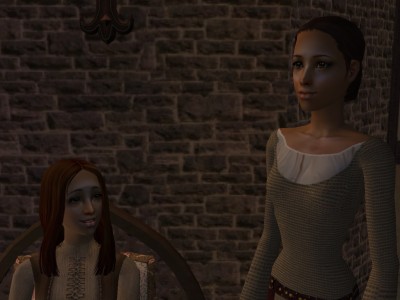
Wynflaed knew she would be next, but she was still startled when he lifted his face to her. She realized that he had scarcely looked at her, except for that moment when he had come in.
“Wyn,” he said, “perhaps you might plant some golden flowers at the door, and then if you are feeling lazy you needn’t go so far?”
He reached over her mother’s chair to hand her a slender wooden box. She knew what was inside, but the box itself troubled her. It was inlaid with small, diamond-shaped tiles of a shimmering, moon-white material. Wynflaed did not know what it was called, but she recognized it from her mother’s precious little comb that she had had from her own mother.
Nor did Wynflaed know the worth of such things, but when she was a small girl, the gleaming comb had held for her the fascination of a sacred relic, and she knew that her mother’s mother had once been a grand lady. This box seemed far too fine a gift for her. She knew she could not accept it.
“What’s in there?” Heafoc asked.
Wynflaed came back to herself and opened it. “Little bags,” she said. “Of seeds, of course?” She glanced up at Sigefrith and found him to be looking intently at her, not quite smiling.
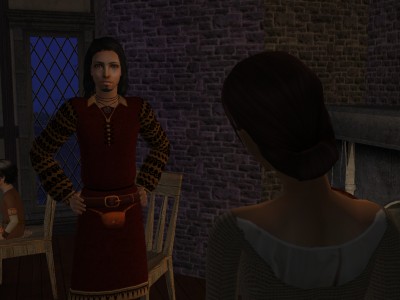
“They had better be,” he said, smiling now. “I did not verify, but I could not be seen to doubt the word of a queen.”
“Is it from your sister?” Mouse asked.
“No, not that queen,” he laughed. “I already know how far I can trust my sister. I mean from the little Queen of Danes, who was quite amused by my request, and I hope she did not mean to play a trick on us—though I fear she might! I asked her for seeds from all the golden flowers of her garden.”
“Bold as you please!” Mouse laughed.
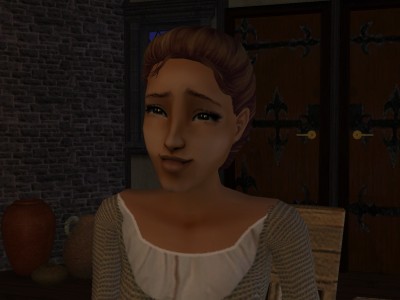
“She’s a funny little girl,” he said, “scarcely older than Wyn, with a big, fat braid of blonde hair down to her knees. You would like her, Mouse. And she’s my cousin—thus I may be so bold.” He said to Wynflaed, “I left a little sack of roots in the barn, which you should have the men plant before the frost. I hope they sprout. I was brutally teased all the way home over my poor sack of ‘onions.’ But I think they are supposed to be flowers.”
“We shall see how far we can trust the Queen of Danes!” Mouse said.
“I thank you,” Wynflaed said. “And our little mother will thank you in the summer. I shall take these up and put them away before you go, so you may have your box.”

“Oh—but you may keep the box.”
“But—”
“My turn!” Mouse crowed. “Not that I am expecting anything. But I want to hurry up and get to Heaf so I can get my kiss.”
“I tell you,” Sigefrith insisted, “Heaf will have it in his mouth as soon as he has it in his hands.”
“Anyway, you didn’t tell me you had it in a bag,” Mouse pouted.
“Do you think I carry things directly in my armpits?” he laughed. “Good Lord! Now I know what a brute I seem to you!”
“Hurry!” Heaf pleaded, squirming like a grub indeed. “Is it something to eat?”
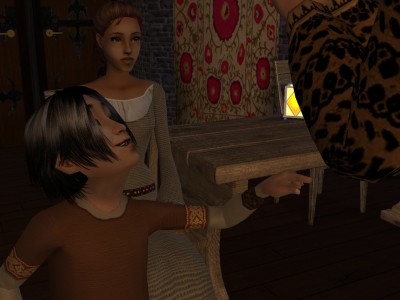
“Patience, lamb,” Sigefrith said.
“But I—I have to go to bed soon!” Heaf cried, pleased at having found a reason, and not yet considering the consequences.
“You will live to regret having said that, my fine man,” Sigefrith said ominously. “So, Mouse, for you I have a gift so rare that only one man in the world knows how to make it, and only two men knew it existed before now.”
“What?” she asked, bewildered.
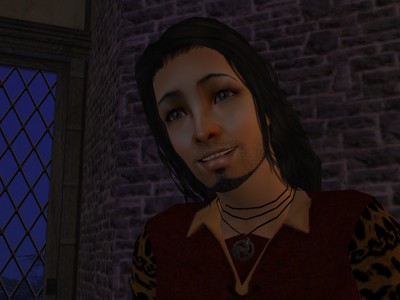
“It is a song, written especially for you by my friend the Duke, and which I shall shortly sing to you, to your great horror. But the song itself is quite charming—it recounts the adventures of a saucy little she-mouse, with a chorus to be sung by goats. Once I have taught you ladies the words, I hope that I may limit myself to the part that suits my talents, and perhaps Heaf and Os will join me if it is not too great an insult to theirs.”
“A song for me!” Mouse said. “Oh, little mother, what do you think of that?”
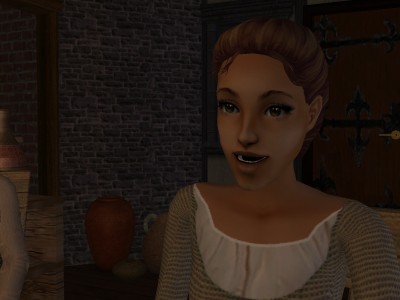
“May you live to hear your great-grandchildren sing it to you,” Sigefrith bowed in his chair. “And may you forgive me when I do.”
“Won’t you sing it now?”
“I shall first need to wet my throat with the cup of wine Heaf is about to win me. But first, Os has shown himself to be of remarkable patience, and so we shan’t make him wait any longer. This, young sir,” he said as he rooted in his bag, “is not for skinning cats, nor for nicking up your little mother’s table, nor for the execution of robbery on the King’s highways, and, while you may use it to clean your fingernails, I would not recommend you do so on any fingers you wish to keep. This, young sir,” he said, presenting it with a flourish, “is a knife which I won fairly from a Spaniard in a wager, and which I fear he acquired through foul means from its original owner, namely a Moor.”
“Oh, Os, be careful!” the little mother cried softly.
“I know how to hold it!” Oswald protested and held up the flashing blade to admire it in the firelight.
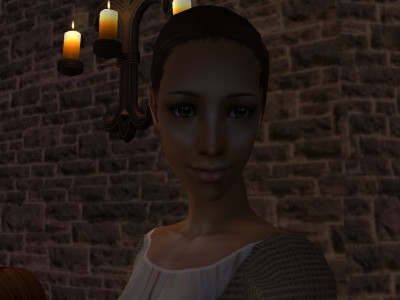
It was a knife, Wynflaed thought, that had been embellished as if it were meant to be jewelry, and it was a handsome piece of work—but it did not look like their good, honest English knives. It looked wicked, as if it were meant only for killing and not for good, honest work.
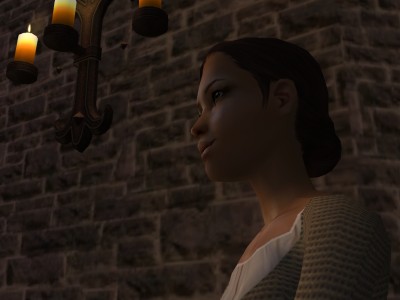
She leaned heavily against the wall, suddenly as exhausted as Heafoc ought to have been at that hour. The little box seemed a great burden at the end of her arm, too fine for her with its shining inlay like slivers of moon. Oswald was as delighted with his knife as any twelve-year-old boy would be with such a possession, but she wondered whether he saw it as a tool or knew it for a weapon. And Mouse was bold and free with Sigefrith: Wynflaed knew she would kiss him if he let her—or let him if he tried.
All the while their little mother was smiling up at him as if he were the prodigal son come home to her. Didn’t her mother see? Or was Wynflaed herself wrong about everything? Perhaps she was only very tired after all.
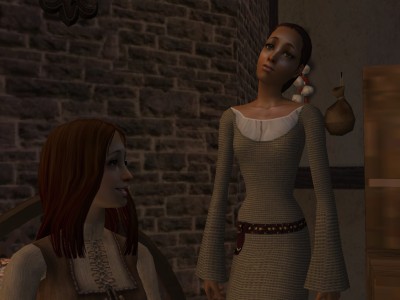
Finally it came Heafoc’s turn, and Sigefrith won his wager. For Heafoc he had brought a slender flute of dark wood, and the little boy had it in his mouth and was trying to make a sound almost before it had left Sigefrith’s hand.
“Ah, I see I shall have to teach you how to play it, or you will simply huff and puff and drive your little mother mad.”
Heafoc held his flute out to him at once.
“Oh, no!” Sigefrith cried. “I know where that thing has been!”
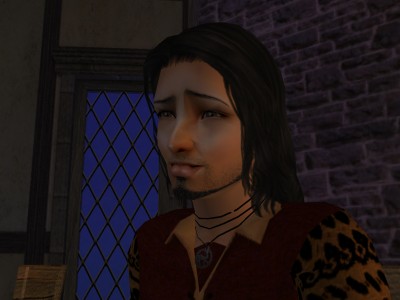
“In your armpit!” Heafoc squealed and then pretended to be deathly ill.
Sigefrith distracted him with the remaining contents of his bag—a handful of pretty shells—and Mouse went out to fetch his wine. Meanwhile Sigefrith picked up the flute and began to play after all, absent-mindedly it seemed, for he still watched the little boy line up and inspect his shells.
Heafoc was delighted at the sounds that he now knew could be produced by his flute, but Wynflaed nearly swooned. It was a beautiful, careless cruelty to her.
The flute had a fine, clear tone, and he had talent for music even if he did not sing. The melody was as lovely as ever, but it was like a sweet poison to her now, and he played on to Heafoc’s rapt enjoyment without a glance at the two pale ladies behind him.
Then Mouse came in with the cup and broke the spell. “But you mustn’t play that one!” she cried.
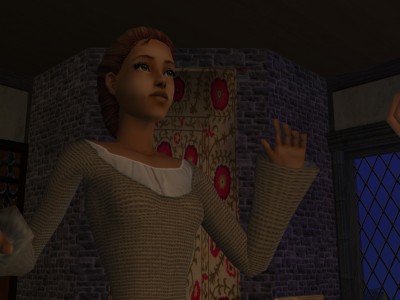
Sigefrith stopped at once. “Oh! I thought you liked that one.”
“We don’t sing that song any longer, Sigefrith,” their little mother said.
“Oh, dear! Because I told you how it ended?”
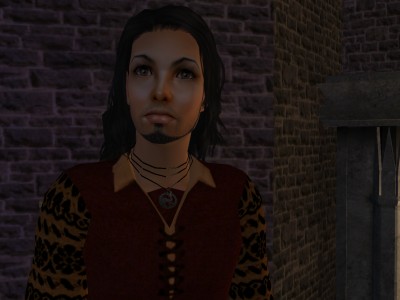
“Yes,” Mouse said, “and because our little mother sang it because you are a lazy knight, and we don’t like to think of you being killed by an arrow. Wyn even dreamt of it.”
Wynflaed was too mortified even to scold her sister.
“I killed by an arrow!” he laughed. “That would be such a fine joke on my father, I almost hope I do die that way, since we all must die. He took an arrow in his heart and was left for dead on the battlefield, and eight years later he showed up here as fit as ever. My mother always said it proved he never had a heart to begin with, but I think she has changed her mind.”
“I hope you don’t die too,” Heafoc said, “if you get shot by an arrow.”
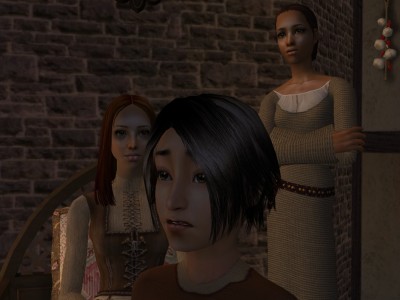
“Ah, but I fear I will,” Sigefrith sighed. “Your fair sisters and your little mother have already proven to me that I have a heart, for it breaks every time I go down the hill.”
“But you don’t die,” Heafoc pointed out.
“It is immediately repaired when I arrive home and see my own little boy and his two fair sisters.”
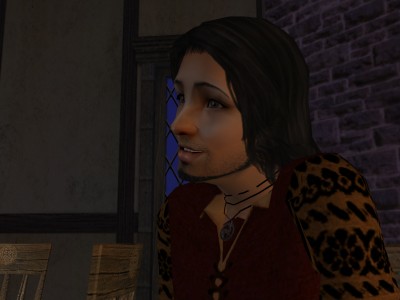
“Doesn’t he have a brother, too, like me?”
“He did, but he died.” Sigefrith spoke simply, with the gentleness of a man who is accustomed to explaining sorrows to small children. But Wynflaed was old enough to hear the ache in his voice.
She laid her slender box on the table beside her and leaned all her body against the wall. She felt hot and dizzy—and foolish to have thought he was the happiest man she knew. Only because he laughed so easily! It seemed a sadder, braver, stronger thing than tears. Her little mother had understood.
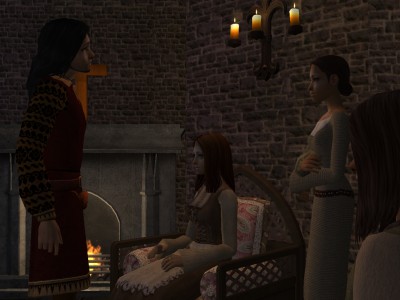
“Wyn?” Sigefrith was saying firmly, as if repeating himself. His eyes too were firm and seemed to be trying to hold her up from across the room. She was confused. Some time had passed, she thought, for he had been sitting and talking to Heafoc when she had last looked at him.
“Oh, Wyn,” her mother sighed, looking up at her for the first time in some while. “She’s so tired,” she explained mournfully to Sigefrith. “She worked so hard today. She’s always trying to do the work of two women.”
“And she’s smaller than one,” Sigefrith said. He was standing; he was holding a hand out to her. “You shall have my chair and my wine, for I think you need them both far more than I.”
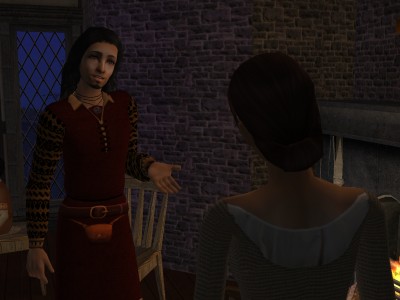
“No, no,” Wynflaed mumbled.
“Wyn,” her mother scolded.
“We might share the wine, if you insist,” Sigefrith said. “The chair too—if you insist,” he winked.
“I wager she won’t be squirming like a grub!” Mouse laughed.
“I would, though, so that’s the end of that. Come, Wyn. I was only teasing about the chair. There are enough chairs for everyone.”
“Enough wine, too, Sigefrith,” their mother said.
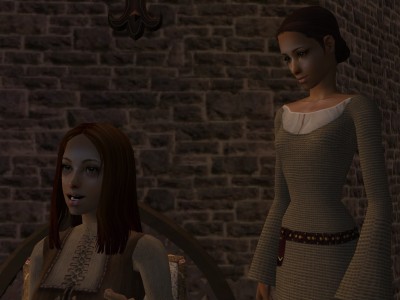
“I shall be thoroughly refreshed myself only having seen her drink it. Come, Wyn,” he coaxed. “Don’t force me to be a gentleman and refuse to sit until you do. You know I’m a lazy man.”
“Come on, Wyn!” Mouse cried. “What a looby you are! I want to hear my song.”
“Hurry up, me too! I have to go to bed soon!” Heafoc reminded them.
Wynflaed had never put her hand in his. To do so now, she would have to stand and reach. She would have to lose the support of the wall for a moment and stand unaided until he had her hand. It would be like leaping—it would be like falling and trusting that she would be caught. None of them realized what he was truly asking her to do, she thought, not even he. But they were all behind her, pushing her, asking her to leap. He was before her, and his eyes were firm and seemed to be asking her to trust him.
The wall was not enough. The heat and the dizziness rushed over her body in waves. Her ears were ringing. Her consciousness was being compressed into a small circle of firelit faces, and she could tell she was about to lose it altogether.
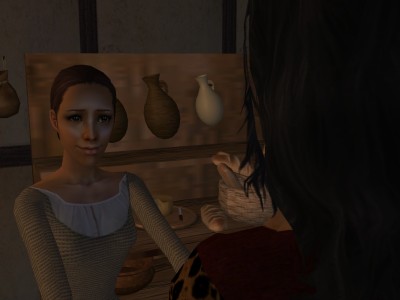
She leaned away from the wall and sent her hand out to find his. They met over her little mother’s head. His hand was broad and solid and warm, and it was stronger than she had imagined. It made her feel stronger only to hold it—and so she held on.
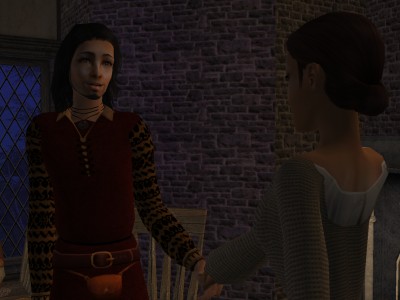







I always like when men come back from travelling ! They are so happy and they have so many adventures to tell !